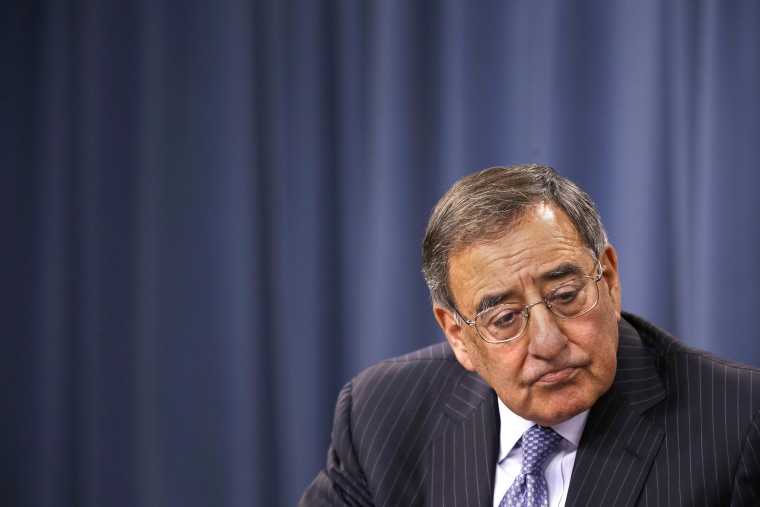Former Defense Secretary Leon Panetta continues to aggressively hawk his book, which generally means running to every news outlet he can find in order to criticize President Obama on the eve of the 2014 midterm elections. If the former Pentagon chief's goal was to get people talking, it worked -- just about every Republican candidate in the nation has suddenly discovered just how much they love Leon Panetta.
Though I haven't read his book, I have seen a wide variety of interviews in which Panetta has made his pitch, and on a purely substantive level, his arguments seem deeply flawed. As we
discussed the other day, Panetta has blamed Obama's withdrawal of U.S. troops from Iraq for the chaos gripping much of the country, even after he
strongly defended Obama's withdrawal policy, repeatedly, characterizing a residual force
as an impossibility.
The former Defense Secretary has complained about U.S. policy in Syria,
conveniently overlooking Obama's successes in ridding Syria of its chemical-weapons stockpiles -- weapons that now can't fall into the hands of Islamic State militants. Making matters slightly worse, Panetta has
also complained about Obama going to Congress last year before intervention in Syria, even while complaining about Obama not going to Congress this year before intervention in Syria.
Panetta has even whined about sequestration budget cuts, blaming the ridiculous policy on the president for reasons that seem entirely
at odds with reality.
Yesterday, Panetta's complaints
devolved just a little further on CBS's "Face the Nation."
President Barack Obama and everyone in Washington must "get into the ring" to stop gridlock in the nation's capital, Leon Panetta says. [...] In his book, Panetta makes comments about how Obama "approaches things like a law professor in presenting a logic of his position." While he agrees that it's good to have "a president who thinks through the issues," Panetta said it's not enough to make a great and effective commander in chief. "Presidents need to also have a heart of a warrior," Panetta said.
Which was right around the time I found it necessary to stop watching.
Rachel will have more on this on tonight's show, taking a closer look at the larger context of this story, but in the meantime, I was struck by Michael Cohen's
recent piece arguing that Panetta has come to represent "what wrong with D.C."
At both Langley and the Pentagon he became a forceful advocate for -- or, some might say, bureaucratic captive of -- the agencies he ran. As CIA Director he pushed back on efforts to expose the agency's illegal activities during the Bush Administration -- in particular, the use of torture (which he had once decried). At DoD he ran around with his hair practically on fire denouncing cuts to the defense budget in out-sized, apocalyptic terms. The "catastrophic," "draconian" cuts would initiate a "doomsday mechanism" and "invite aggression," he claimed and always without specific examples. Ironically, when Panetta was chairman of the House Budget Committee in the early 1990s, he took the exact opposite position and pushed for huge cuts to the defense budget. For Panetta, principles appear to be determined by wherever he happens to be sitting at any given moment. However, his irresponsible threat-mongering and his constant stream of gaffes and misstatements (like the claim that the US was in Iraq because of 9/11 and that the war was worth it) masked a stunningly narrow and parochial foreign policy vision. It wasn't just that Panetta was saying crazy things. As his new memoir shows, he apparently believed them.
Or did he? The fact that Panetta seems to reverse course so effortlessly raises questions about which of his core beliefs are genuine, and which are the result of the political considerations of the moment.
He's become quite adept at blaming Obama for things that don't appear to be the president's fault, offering vague platitudes as an alternative for sound policy proposals, and suggesting the use of force is always the right course, but after listening to Panetta go on (and on) for the last couple of weeks, I have decreasing confidence in the intellectual integrity of what he actually believes.
